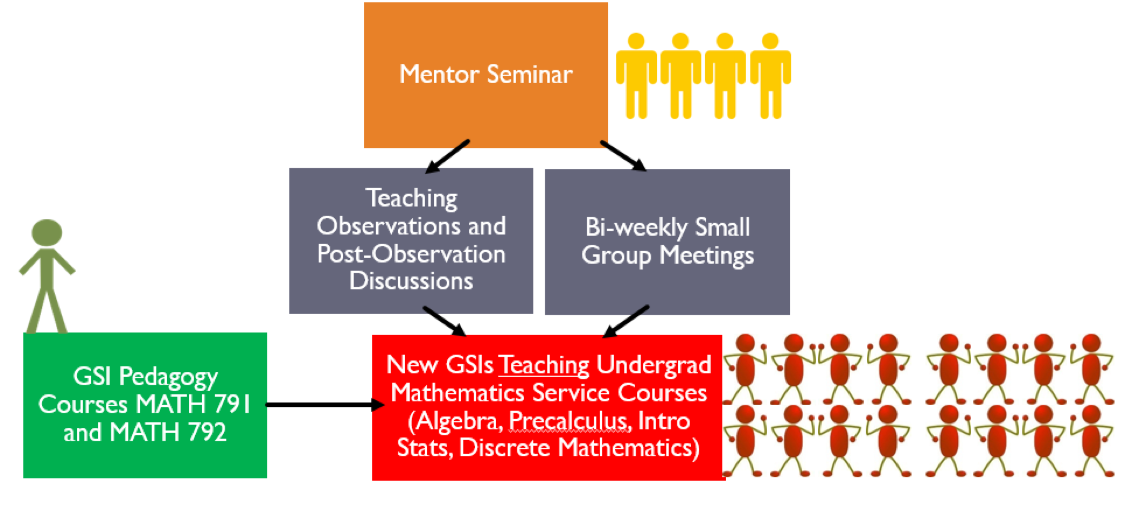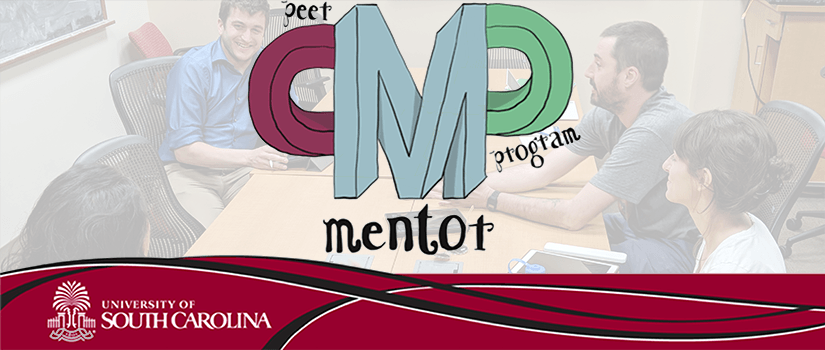Introduction
During a mathematics graduate student’s development at USC, they transition from Graduate Teaching Assistant (GTA, e.g. recitation instructor) to Graduate Student Instructor (GSI, e.g. full instructor of record). This transition is supported through mathematics graduate student orientation, observations, the two pedagogy courses (Math 791 and Math 792), and the peer mentor program. Initially funded by the National Science Foundation (NSF Awards #1544346 & #1725295), the peer mentor program provides two critical foundations for support: teaching observations and small-group discussions around teaching. Experienced graduate students are trained as mentors to facilitate productive and open discussions about the challenges facing teaching and provide post-observation feedback to first year (novice) GSIs. These two levels of support have been beneficial to the USC mathematics department culture of graduate student teaching as well as undergraduate student learning (Yee & Rogers, 2016; Yee & Rogers, 2017a, 2017b, 2017c; Rogers & Yee, 2018).
The following logic model demonstrates the layers of support from GTAs to GSIs at USC:

Parts of Peer Mentor Program
Included in the development of the peer mentor program are:
- A full semester-long professional development to teach mentors how to facilitate meetings and observations with novices.
- The Graduate Student Instructor Observation Protocol (GSIOP, Yee et al., 2019) designed for GSIs teaching service mathematics courses emphasizing student engagement.
- Post-Observation Feedback Structure (Red-Yellow-Green Feedback, Yee et al., 2019) where mentors give supportive and nurturing feedback on how to improve.
- Small group meeting topics of value to novice GSIs including, but not limited to: collaborative learning, student engagement, critical reflection, managing constructive criticism, formative and summative assessment, grading, classroom management, creating/modifying lesson plans, time management, specific content advice.
- Yee, S.P., Deshler J., Rogers, K.C., Petrulis R., Potvin, C.D., Sweeney, J. (2019, February). Bridging the Gap: From Graduate Student Instructor Observation Protocol to Actionable Post-Observation Feedback. Proceedings from 22nd Conference of the Research in Undergraduate Mathematics Education (RUME), Oklahoma City, OK.
- Rogers, K.C. & Yee, S.P. (2018, February). Peer mentoring mathematics graduate student instructors: discussion topics and concerns. Proceedings from 21st Conference of the Research in Undergraduate Mathematics Education (RUME), San Diego, CA.
- Rogers, K. C. & Yee, S.P. (2017a, November). Experienced and novice graduate students navigating mathematics instruction together. Proceedings from 39th Conference of the North American Chapter of the Psychology of Mathematics Education (PME-NA, p.539), Indianapolis, IN.
- Yee, S.P. & Rogers, K. C. (2017b, March). Training graduate student instructors as peer mentors: how were mentors’ views of teaching and learning affected? In T. Olson & L. Venenciano (Eds.), Proceedings from 44th Annual Research Council on Mathematics Learning (RCML, pp. 33-44), Fort Worth, TX: Research Council on Mathematics Learning (RCML).
- Yee, S.P. & Rogers, K. C. (2017c, February). Mentor professional development for mathematics graduate student instructors. Proceedings from 20th Conference of the Research in Undergraduate Mathematics Education (RUME, pp. 1026-1034 ), San Diego, CA.
- Yee, S.P. & Rogers, K. C. (2016, February). Graduate students’ pedagogical changes using iterative lesson study. Proceedings from 19th Conference of the Research in Undergraduate Mathematics Education (RUME, pp. 1458-1466), Pittsburgh, PA.
